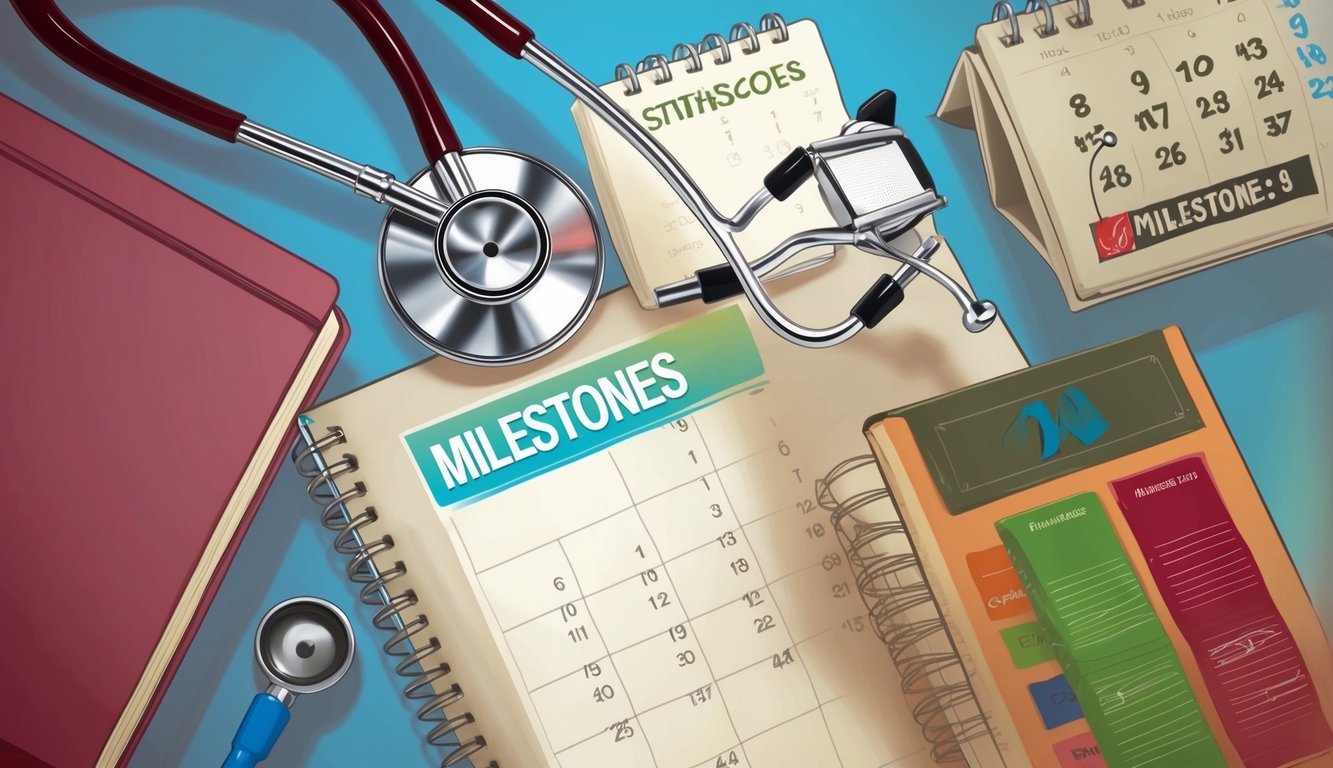Starting your journey in nursing can feel overwhelming, but understanding the nursing school timeline can help make the path clearer. Becoming a nurse typically takes between one and eight years, depending on your chosen path and educational background.
Whether you are looking to earn a diploma, an associate degree, or a bachelor’s degree, each option has different timelines and requirements.
As you explore nursing programs, consider how long you’re willing to study and what type of nurse you want to become.
Each step, from undergraduate education to passing the NCLEX for licensure, plays a crucial role in your career advancement.
Furthermore, the opportunities for specialization and continuing education can expand your career even further.
Understanding the timeline and options will help you make informed decisions about your education and future job prospects in this rewarding field.
Key Takeaways
- You can become a nurse in as little as one year or take up to eight years for advanced degrees.
- Passing the NCLEX is essential to becoming a licensed nurse.
- Continuing education is crucial for career advancement in nursing.
Understanding the Path to Nursing

The path to becoming a nurse involves several levels of education and important milestones throughout your career.
Each step provides valuable experience and credentials that are essential for your growth in the nursing field.
Levels of Nursing Education
Nursing education typically begins with foundational programs.
Here’s a breakdown of the main types:
| Level | Description | Duration |
|---|---|---|
| Certified Nursing Assistant (CNA) | Provides basic patient care under supervision. | A few weeks to 6 months |
| Licensed Practical Nurse (LPN) | Offers basic nursing care and may administer medications. | About 1 year |
| Registered Nurse (RN) | Involves comprehensive patient care and management. | 2-4 years (ADN or BSN) |
| Advanced Practice Registered Nurse (APRN) | Includes Nurse Practitioners and Clinical Nurse Specialists. | Master’s degree (2-3 years after RN) |
You can choose from an Associate Degree in Nursing (ADN), usually taking two years at a community college, or a Bachelor of Science in Nursing (BSN), which typically lasts four years at a university.
Each path has unique advantages and can influence your career opportunities.
Key Milestones in a Nursing Career
Throughout your nursing career, certain key milestones will mark your progress.
These moments are important for your professional development.
- Graduation from Nursing School: Completing your nursing program is a major achievement. You become eligible to take the NCLEX-RN exam if you’re pursuing RN status.
- Obtaining Licensure: After passing the NCLEX, you need to obtain your nursing license, which allows you to practice legally.
- Gaining Experience: After starting your job, gaining hands-on experience will help you develop essential skills. You may also attend workshops or additional training.
- Pursuing Specialization: Many nurses continue their education to specialize. This can lead to roles such as Nurse Practitioner or Clinical Nurse Specialist, expanding your scope of practice and potential earnings.
As you follow this path, remain committed to lifelong learning to enhance your practice and adapt to the changing healthcare environment.
For more details on nursing paths, consider visiting resources like RNCareers and Nurse.org.
Undergraduate Nursing Education

Undergraduate nursing education includes different paths to help you become a nurse.
You can earn an Associate’s Degree in Nursing (ADN) or a Bachelor of Science in Nursing (BSN).
Additionally, accelerated BSN programs offer a faster route for those who already hold a degree in another field.
Earning an Associate’s Degree in Nursing (ADN)
An Associate’s Degree in Nursing (ADN) typically takes about two years to complete.
This program combines classroom training with hands-on clinical experience.
During your studies, you will cover essential subjects such as:
- Nursing fundamentals
- Anatomy and physiology
- Pharmacology
Clinical rotations provide valuable experience in settings like hospitals and clinics.
After completing your ADN, you can take the NCLEX-RN exam to become a registered nurse.
Many community colleges and nursing schools offer ADN programs, often with flexible schedules.
You can also explore online nursing programs that allow you to balance studies with work or other commitments.
Pursuing a Bachelor of Science in Nursing (BSN)
A Bachelor of Science in Nursing (BSN) is a four-year degree that prepares you for a broader scope of nursing practice.
This program emphasizes leadership, research, and community health, alongside core nursing skills.
Key components of a BSN program include:
- Advanced nursing concepts
- Health assessment
- Nursing ethics
BSN graduates are often preferred by employers.
Additionally, this degree opens doors for advanced roles in nursing or further education, like pursuing a Master of Science in Nursing (MSN).
You can find traditional BSN programs or consider hybrid options that blend online learning with classroom instruction.
Exploring Accelerated BSN Programs
If you already have a degree in another subject, an accelerated BSN program can be an efficient way to enter the nursing field.
These programs typically last 12 to 18 months.
Accelerated programs focus on:
- Nursing theory
- Clinical practice
- Critical thinking skills
Classes are intensive and fast-paced, designed for individuals who can commit fully to their studies.
You will also engage in clinical rotations, providing real-world experience needed to succeed.
Many universities offer these programs, making it accessible for you to transition into a nursing career quickly.
If you’re currently an LPN, consider LPN to RN bridge programs that facilitate the transition to a registered nurse.
Graduate Nursing Education and Specialization
Graduate nursing education offers advanced training and specialization for nurses seeking to enhance their skills and career opportunities.
Understanding the paths available can help you make informed choices for your future.
Obtaining a Master of Science in Nursing (MSN)
A Master of Science in Nursing (MSN) prepares you for advanced roles in nursing.
This degree usually takes about two years to complete after earning a Bachelor of Science in Nursing (BSN).
During the program, you will engage in both coursework and clinical experiences.
Core subjects often include nursing leadership, healthcare policy, and advanced pathophysiology.
Elective options allow you to focus on specific interests, such as pediatric nursing or nursing education.
You become eligible for roles like Nurse Practitioner (NP), Clinical Nurse Specialist, or Certified Registered Nurse Anesthetist (CRNA) upon graduation.
These positions often lead to higher salaries and more job opportunities, as advanced practice registered nurses (APRNs) are in high demand.
Engaging in Doctor of Nursing Practice (DNP) Programs
Doctor of Nursing Practice (DNP) programs represent the highest level of nursing education.
This terminal degree typically requires an additional 2-5 years of study, depending on your prior education.
The program focuses on clinical practice, healthcare leadership, and evidence-based practice.
You will learn to apply research to real-world healthcare challenges, improving patient outcomes.
Courses might cover topics like healthcare economics, informatics, and advanced nursing research.
Completing a DNP qualifies you for top-tier roles in healthcare settings and academia.
It opens doors to leadership positions and enhances your ability to influence nursing practice and policy on a broader scale.
Specialty Tracks for Nurse Practitioners (NP)
Nurse Practitioners (NPs) can choose from various specialty tracks during their graduate education.
These specialties allow you to tailor your career to your interests and the needs of your community.
Common NP specialties include:
- Family Nurse Practitioner (FNP)
- Pediatric Nurse Practitioner (PNP)
- Adult-Gerontology Nurse Practitioner (AGNP)
- Psychiatric-Mental Health Nurse Practitioner (PMHNP)
Each track requires specialized training to equip you for specific patient populations.
For example, a Pediatric NP focuses on children’s health, while a Psychiatric NP emphasizes mental health care.
Completing a specialty track can increase your job marketability and ensure you meet diverse patient needs.
The NCLEX and Licensure
Passing the NCLEX-RN exam is essential for gaining a nursing license.
This section covers the important steps in preparing for the exam and understanding the licensure process in your state.
Preparing for the NCLEX-RN Exam
To become a registered nurse, you must pass the NCLEX-RN exam.
This test evaluates your knowledge and skills to ensure you’re ready for safe nursing practice.
Start your preparation early. Study resources include textbooks, practice exams, and online study groups.
Consider creating a study schedule to keep you on track.
Here are some effective study tips:
- Focus on key topics: Make sure to cover vital areas like health promotion and maintenance, safety, and infection control.
- Practice tests: These help you familiarize yourself with the exam format and question types.
- Study groups: Collaborating with peers can enhance learning and provide motivation.
Utilizing these strategies can boost your confidence and readiness for the exam.
State Licensure for Nursing Professionals
Once you pass the NCLEX-RN, you’ll apply for your nursing license through your state’s board of nursing.
Each state has unique requirements, but general steps include:
- Submit your application: This often requires proof of education and exam results.
- Background check: Many states require fingerprinting and a criminal background check.
- Fees: Be prepared to pay various application fees, which can range from $100 to $400.
For more information on state-specific requirements, visit Nurse.org’s guide.
After you obtain your nursing license, you can explore other advanced options, such as becoming a licensed practical nurse (LPN), advanced practice registered nurse (APRN), or certified registered nurse anesthetist (CRNA).
Each of these roles requires additional education and certification.
Career Advancement and Continuing Education
Pursuing additional education and training is essential for growing your nursing career.
It allows you to open new doors and take on more responsibilities.
Here are some key areas to consider in your journey.
Pursuing Advanced Degrees and Certifications
Obtaining an advanced degree can significantly enhance your qualifications.
You can pursue a Master of Science in Nursing (MSN) or a Doctor of Nursing Practice (DNP).
These degrees can prepare you for advanced practice roles, such as Nurse Practitioner (NP) or Nurse Educator.
Certifications in specialty areas, like critical care or pediatrics, can also boost your career.
Consider enrolling in an online nursing degree program to balance work and study effectively.
Transition Programs: LPN to BSN, RN to BSN, and BSN to MSN
Transition programs, such as LPN to BSN or RN to BSN, offer pathways to advance your education.
These programs are designed for those who already have nursing experience and wish to expand their knowledge and skills.
For example, RN-to-BSN programs often focus on leadership and healthcare policy.
If you hold a BSN, you can opt for an RN-to-MSN program to delve deeper into specialized areas.
These programs facilitate your move into advanced practice and management roles.
Leadership and Healthcare Management Opportunities
Developing leadership skills can prepare you for roles in nursing management.
As a nurse manager, you can influence team performance and improve patient care solutions.
Many organizations offer training in healthcare management.
You may also need to gather letters of recommendation for advanced positions.
Engaging in seminars or workshops can expand your network and understanding of healthcare policies.
Embrace these opportunities to build a rewarding nursing career with leadership and impact in healthcare.
Frequently Asked Questions

This section addresses common inquiries about the duration of nursing school and the paths to becoming a nurse.
You will find specific timelines for different nursing degrees and programs.
What is the typical duration of nursing school after completing undergraduate studies?
After finishing your undergraduate studies, pursuing a Bachelor of Science in Nursing (BSN) typically takes about 2-3 additional years.
If you already have a degree in a different field, accelerated programs can allow you to complete your BSN in about 12-18 months.
For more information, you can check Nurse.org.
How long does the process take to qualify as a Registered Nurse following high school graduation?
If you graduate from high school, it usually takes about 2-4 years to become a Registered Nurse (RN).
This timeframe varies based on the program you choose.
An Associate Degree in Nursing (ADN) can take around two years, while a BSN takes four years.
You can read more at RN Careers.
What is the duration for acquiring an RN degree through a community college?
Acquiring an RN degree through a community college typically takes around two years if you are enrolled in a full-time Associate Degree in Nursing (ADN) program.
Part-time students may take longer, depending on their course load.
Additional details are available at Nurse Journal.
After fulfilling prerequisite requirements, what is the expected length of time to attend nursing school?
Once you complete your prerequisites, you can expect to spend around 1-2 years in nursing school for an ADN or BSN program.
Prerequisites can include courses in biology, chemistry, and anatomy, which typically take 1-2 years to complete.
For more guidance, visit Nurse.plus.
How many years of education are required to become a Nurse Practitioner?
To become a Nurse Practitioner (NP), you generally need about 6-8 years of education.
This includes obtaining a Bachelor of Science in Nursing (BSN), then pursuing a Master of Science in Nursing (MSN), which usually takes an additional 2-3 years.
More information can be found at Nurse.org.
What are the fastest pathways to becoming a Registered Nurse?
The fastest routes to become a Registered Nurse are through accelerated programs.
These programs often allow you to earn your BSN in 12-18 months.
Many community colleges also offer bridge programs for those with previous degrees.
For further reading, see Nightingale College.

